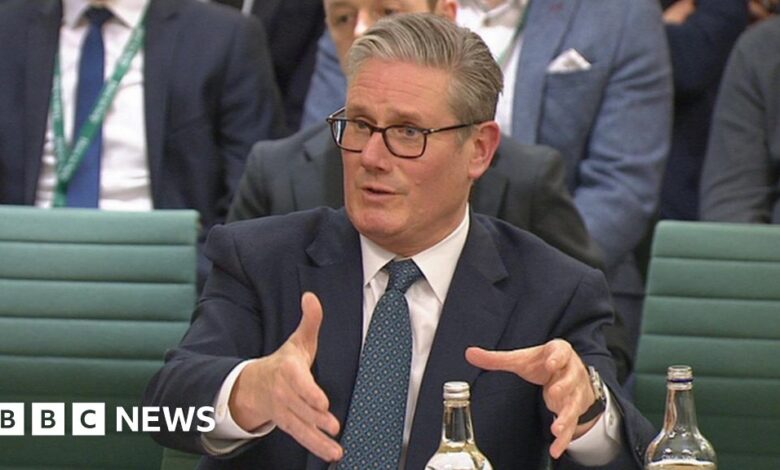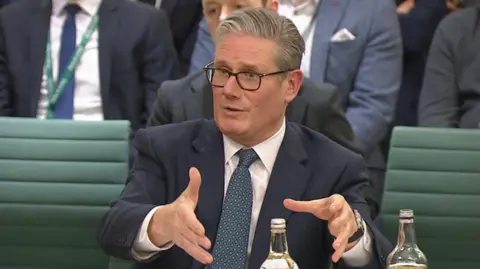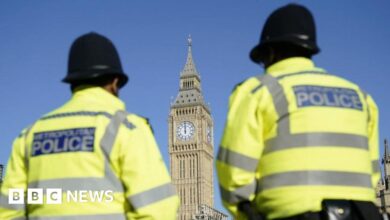I wouldn’t change first five months as PM, says Keir Starmer

 House of Commons
House of CommonsSir Keir Starmer has insisted he would not do anything differently, as he came under fire from MPs over decisions in his first five months in office.
The prime minister defended changes to farmers’ inheritance tax, hikes to business taxes and cuts to winter fuel payments in 90 minutes of questions.
Labour “had to do tough stuff” to stabilise the public finances after being left an “awful” inheritance from the Conservatives, he said.
He insisted he was still committed to achieving the highest “sustained” growth among G7 countries by the next election.
But he warned it could “take some time” for people to feel better off, as he asked for patience on his plans to boost the economy.
It comes as the Bank of England said the economy had performed worse than expected, with no growth at all between October and December.
Sir Keir set the G7 growth target in early 2023, more than a year before his party returned to power at July’s general election.
Earlier this month, he announced an additional target to improve living standards, leading to some accusations he was moving the goalposts on what he wanted his government to be judged by.
But in his first appearance before the liaison committee of senior MPs since entering office, Sir Keir insisted he was still committed to getting the UK growing faster other G7 members, such as the US, Germany and Japan, by 2029.
When it was pointed out to him that economic forecasts suggested this was not going to happen, he said they had not taken some future policy changes into account.
He cited a rise to the legal minimum wage, announced at October’s Budget, as an example of how ministers were boosting living standards.
He added that changes to the planning system, other “regulations” and new technology such as artificial intelligence (AI) would also help improve the UK’s economic growth rates.
‘Position of power’
But the prime minister faced sustained questioning from the select committee chairs over policies decisions that have not gone down well with the opposition and, in some cases, his own MPs.
These include cuts to the winter fuel payment for pensioners, changes to farmers’ inheritance tax status, and freezing the amount of housing benefit that private renters can claim next year.
Asked by the committee’s Labour chair Meg Hillier whether he would do anything differently in his first months in power if he knew what he does now, Sir Keir replied: “No.”
“We had to do tough stuff, we’re getting on with it,” he added.
On life as prime minister, he said he was “pleased to be delivering from a position of power” rather than losing votes in the House of Commons “every night” in opposition.
Elsewhere in the liaison committee session:
- Sir Keir warned the UK must not “make the mistake” of assuming a future Syrian government is “necessarily going to be different and better” than that of ousted leader Bashar al-Assad
- He added he was “alive to the danger” of Donald Trump imposing tariffs on the UK when he takes office, but insisted they could be avoided
- He insisted his plans to negotiate an agreement with the EU on food safety rules did not rule out a future trade deal with the United States
Asked when people would feel better off as a result of his government’s policies, the PM said: “It will take some time, of course it will”.
“The planning will take time. The change in regulation will take time, we’ve got a national wealth fund which is investing, getting record investment into the country, that will take time.
“But already some of the lowest paid are already feeling the benefits of a Labour government through what we did in the Budget.”
Labour has complained of the inheritance it was left by the Conservatives, including a disputed £22bn “black hole” in spending plans for this year.
At the Budget it announced plans to raise taxes, including the amount of National Insurance paid by employers from next April.
Ministers have insisted the move was necessary to put the country’s finances on a firmer footing – but they have faced opposition criticism that the move will stymie efforts to boost the UK’s economic fortunes.




